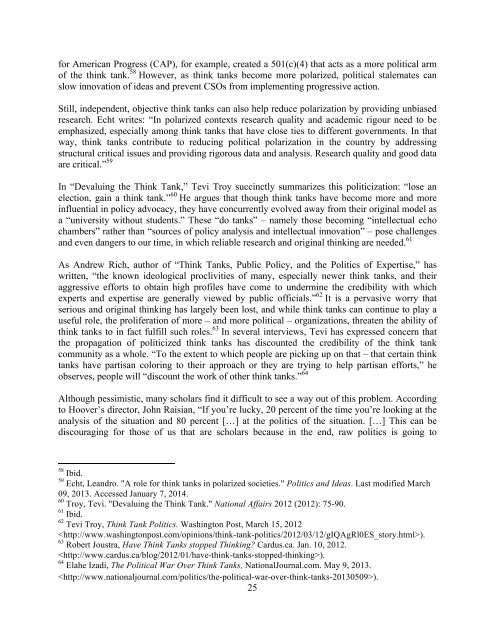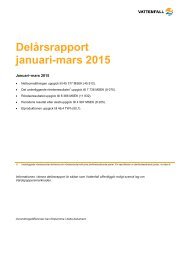2014-global-go-to-think-tank-index-22012015_1
2014-global-go-to-think-tank-index-22012015_1
2014-global-go-to-think-tank-index-22012015_1
- No tags were found...
Create successful ePaper yourself
Turn your PDF publications into a flip-book with our unique Google optimized e-Paper software.
for American Progress (CAP), for example, created a 501(c)(4) that acts as a more political arm<br />
of the <strong>think</strong> <strong>tank</strong>. 58 However, as <strong>think</strong> <strong>tank</strong>s become more polarized, political stalemates can<br />
slow innovation of ideas and prevent CSOs from implementing progressive action.<br />
Still, independent, objective <strong>think</strong> <strong>tank</strong>s can also help reduce polarization by providing unbiased<br />
research. Echt writes: “In polarized contexts research quality and academic ri<strong>go</strong>ur need <strong>to</strong> be<br />
emphasized, especially among <strong>think</strong> <strong>tank</strong>s that have close ties <strong>to</strong> different <strong>go</strong>vernments. In that<br />
way, <strong>think</strong> <strong>tank</strong>s contribute <strong>to</strong> reducing political polarization in the country by addressing<br />
structural critical issues and providing ri<strong>go</strong>rous data and analysis. Research quality and <strong>go</strong>od data<br />
are critical.” 59<br />
In “Devaluing the Think Tank,” Tevi Troy succinctly summarizes this politicization: “lose an<br />
election, gain a <strong>think</strong> <strong>tank</strong>.” 60 He argues that though <strong>think</strong> <strong>tank</strong>s have become more and more<br />
influential in policy advocacy, they have concurrently evolved away from their original model as<br />
a “university without students.” These “do <strong>tank</strong>s” – namely those becoming “intellectual echo<br />
chambers” rather than “sources of policy analysis and intellectual innovation” – pose challenges<br />
and even dangers <strong>to</strong> our time, in which reliable research and original <strong>think</strong>ing are needed. 61<br />
As Andrew Rich, author of “Think Tanks, Public Policy, and the Politics of Expertise,” has<br />
written, “the known ideological proclivities of many, especially newer <strong>think</strong> <strong>tank</strong>s, and their<br />
aggressive efforts <strong>to</strong> obtain high profiles have come <strong>to</strong> undermine the credibility with which<br />
experts and expertise are generally viewed by public officials.” 62 It is a pervasive worry that<br />
serious and original <strong>think</strong>ing has largely been lost, and while <strong>think</strong> <strong>tank</strong>s can continue <strong>to</strong> play a<br />
useful role, the proliferation of more – and more political – organizations, threaten the ability of<br />
<strong>think</strong> <strong>tank</strong>s <strong>to</strong> in fact fulfill such roles. 63 In several interviews, Tevi has expressed concern that<br />
the propagation of politicized <strong>think</strong> <strong>tank</strong>s has discounted the credibility of the <strong>think</strong> <strong>tank</strong><br />
community as a whole. “To the extent <strong>to</strong> which people are picking up on that – that certain <strong>think</strong><br />
<strong>tank</strong>s have partisan coloring <strong>to</strong> their approach or they are trying <strong>to</strong> help partisan efforts,” he<br />
observes, people will “discount the work of other <strong>think</strong> <strong>tank</strong>s.” 64<br />
Although pessimistic, many scholars find it difficult <strong>to</strong> see a way out of this problem. According<br />
<strong>to</strong> Hoover’s direc<strong>to</strong>r, John Raisian, “If you’re lucky, 20 percent of the time you’re looking at the<br />
analysis of the situation and 80 percent […] at the politics of the situation. […] This can be<br />
discouraging for those of us that are scholars because in the end, raw politics is <strong>go</strong>ing <strong>to</strong><br />
58 Ibid.<br />
59 Echt, Leandro. "A role for <strong>think</strong> <strong>tank</strong>s in polarized societies." Politics and Ideas. Last modified March<br />
09, 2013. Accessed January 7, <strong>2014</strong>.<br />
60 Troy, Tevi. "Devaluing the Think Tank." National Affairs 2012 (2012): 75-90.<br />
61 Ibid.<br />
62 Tevi Troy, Think Tank Politics. Washing<strong>to</strong>n Post, March 15, 2012<br />
).<br />
63 Robert Joustra, Have Think Tanks s<strong>to</strong>pped Thinking Cardus.ca. Jan. 10, 2012.<br />
).<br />
64 Elahe Izadi, The Political War Over Think Tanks, NationalJournal.com. May 9, 2013.<br />
).<br />
25




